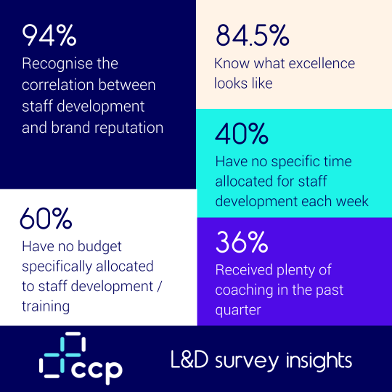
Reviewing the results there was a clear view that people know their roles, the different aspects of it, the impact of people development and appropriate investment in it and the importance of the ongoing development of people in contact centre environments.
We know why we are here and what we are supposed to do
This survey area scored strongly and aligns with wider miPerform research around front line staff and how they are engaged, there is no shortage of data at a senior level, however those who engage directly with customers are perhaps less likely to see the strategic objectives of an organisation. There are still opportunities to unlock further value from customer conversations, ensuring people have the right skills and knowledge to engage in these.

I know what excellence looks like in my role
84.5% of participants in the survey believe that they know what excellence in their role looks like. However, the ability to demonstrate this to customers and to clients is something to be considered, how can we ensure that we are measuring and reporting the service that is being delivered? Measures like CSAT are always considered, however the retention of both customers and critically employees, which could be the most significant metric as staff who are engaged, know their role, are confident in their delivery are happier in their work, they will not only delight customers but will be less likely to leave due to feeling undervalued. This results in unquestionable benefits the employee, customer and business.
“It is essential that leaders and managers have the capability to maintain a culture where people can connect with the role”
The ability to deliver continuous feedback in the right way so that people feel supported and empowered is critical to people wanting to, and being able to share that knowledge with customers.
Staff development plays a huge role in brand reputation, perhaps as an output of increase productivity and delivery of service levels, with 94% suggesting a strong correlation to the impact on this.
However there was sometimes a clear disparity between the amount of time available for staff training and the recognised benefits equally there were times when the time available was much higher than expected. Another key theme was there was a gap between in knowledge about what specifically people needed to be trained on, to ensure that there is value in coaching there needs to be better analysis as to where the training is needed and what technology can be used in supporting this.
Ensuring that coaches and trainers have the right insights to direct training as effectively as possible can be supported by technology:
- Focusing efforts with support on the right subjects and with the appropriate delivery methods,
- These may be conversations within the operation, not necessarily removing people from the operation to sit in a training room
- Remote working needs to be considered in this context with the appropriate monitoring and support,
- Training still needs to be specific to the needs of the individual,
- Which enables us to think more about how we make training and coaching really count for the individual?
Tools like Cognexo as a micro learning solution can take as little as 2 minutes per day and be delivered through a channel aligned to the daily tasks of the staff member, therefore engagement levels are maintained above 91% as it is part of the daily routine.
Behaviour shifts are the result of the right conversations.
It isn’t always necessary to take people out of their day-to-day environment to change culture or behaviours and the role of the manager in ensuring that they are “walking the walk” being a visible leader, providing coaching and support, leading with the right insights ensures the most impact.
Managers must be able to understand their people as individuals, that the outcomes that need to be delivered for the customers require appropriate trust and autonomy due to the unique nature of customer interactions which is increasingly pertinent as AI and automation completes the easier tasks, we need to consider what measure and how we manage. Whilst this may feel obvious, the shift to home working may make access to these skills harder for our next generation of Team Leaders.
We need to listen to the experiences of the front line staff, the roles are getting harder, but we need to ensure people are allowed to contribute to the process, to provide feedback about the processes and how things may be done differently, technology may be used for surveys with employees and to consolidate those responses, with a workflow to the management to ensure that all staff feedback is captured.
“Managers need to ensure that they understand their people on a personal level”
Enabling people to review their own performance and to track against the expected levels of delivery empowers them to properly understand where they are, how they are doing and where they may need support.
This can be used as a tool to support culture change, however, when time can be limited because of operational pressures so the subject matter and insight of what training or coaching is critical to get the right support to staff at the right time.
Budgets may not always be allocated to ongoing training and investment time may not always be scheduled as often as people may like, ROI models around attrition reduction benefits and how this filters through the business in other impacts, the role of ongoing personal development to retaining staff and supporting the growth of brand reputation,
In a world of AI we still need to ensure investment in people
A 1% increase in engagement can deliver a 2% increase in productivity, there are multiple benefits as a result, using coaching and learning to deliver contact centre culture is not achieved through pizza on a Friday, technology can be useful but we need to ensure that people within the organisation are considered in the mix, from agents and first line manager levels, who need to see that the insights are being used through to the senior team who may need stronger insights to drive strategic decision making.
If you’d like to talk further then please contact me directly and we can look at how we can help.



